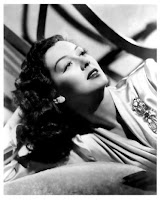As further evidence of my profound geekiness…I am a sucker for classic movies. Turner Classic Movies is my favorite television channel, and the DVR is loaded with some of the greats.
This is apparently “Rosalind Russell” month on TCM, so I recorded a movie called Sister Kenny a few days ago, and watched it last night. Sister Kenny is a biopic about, um, Sister Kenny–an Australian nurse who, while practicing in the remote Australian bush, accidentally discovered an effective treatment for polio years before the vaccine was discovered. (For those who are confused, Kenny was her last name, and she was not a nun. The term “sister” was used for nurses in the Australian military.)
The story itself is compelling. In a part of the bush country where there were no doctors, Elizabeth Kenny was treating a suspected polio victim, and after hearing by wire from a doctor that there was no cure, was simply instructed to “…treat them according to the symptoms as they present themselves.” As she simply used common sense to “treat the symptoms”–without the benefit of the extra medical education–she brought several children to full recovery with no crippling effects.
Sister Kenny effectively spent the remainder of her life trying to convince the established medical community of the validity of her treatment methods, while continuing to treat polio patients as she had opportunity. What is remarkable is how much resistance she encountered, even in the face of proven results. Her methods flew in the face of the established beliefs about polio and its treatment; while she was helping children recover, many children under the old system went through needless agony, only to remain crippled for life afterward. In most cases, the resistance came simply because her treatments and terminology were not found “in the books”, and many in the medical community labeled her a quack and said her methods were dangerous. So deeply ingrained was this mentality within the medical institutions that when confronted with patients who had recovered, the doctors simply claimed that they could not possibly have had polio. They simply could not accept the evidence that was set clearly in front of them. Although she gained great poplularity with the public who visited her clinics, it wasn’t until many years later that her methods began to take hold in the mainstream medical community.
It is a classic case of an institution resisting change simply because it did not come from within itself. Interestingly (at least in the movie), Sister Kenny never thought of the doctors as her enemy; she respected their sincerity, and only wanted to help them to help the children. In her mind, they were on the same team. But the institutions of medicine did not want to listen to Sister Kenny because:
- She was a woman.
- She was a nurse and not a doctor (and doctors did not like to be shown up by nurses).
- Her treatment, though effective, challenged long-held mindsets.
It is a classic case of an institution resisting change simply because the change did not come from within itself.
Can you guess why I’m telling you this story? Hmm…does it remind you of any other institutions you know?

Jeff,
I agree with you. The institutional church is extremely sexist. Rare is the church or it’s pastor who will acknowledge that God gives the same gifts to women that He gives to men.
Most churches limit women to childrens ministry and womens ministry. It’s a shame that it has been that way for so long, and that it has ever been that way.
The institutional church is cheating itself out of many blessings by keeping women from using their gifts in ministry to the church.
There are many women who are at least as gifted and anointed as men if not more so. I know because I happen to be married to one.
Blessings,
Gary
I’m a sucker for a good story. It wasn’t until you were almost finished with the 4th paragraph and used the word institution that I realized the analogy you were drawing. Nicely done, by the way.
I think that is fairly standard across the board whether medicine, education, business, or Christianity. The powers, whoever they are, are easily threatened by the new, especially when it comes in non-standard form. Great reminder, thanks.
Michael
Gary,
Thanks, and I agree. I, too, am married to a great and gifted woman. 🙂
Michael,
I agree. What is it about the “powers that be” in any field that make them so resistant? One of the symptoms of fallen human nature, perhaps? Something to chew on, and maybe blog about. 🙂
BTW…from yesterday’s comment, I finally found your blog and subscribed to it. I’ve been meaning to thank you for the link love and the kind words you wrote there.